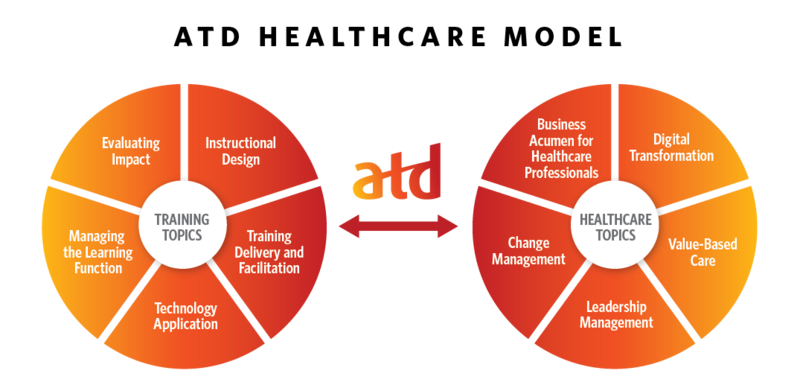ATD Blog
Getting to Agile: Talent and Leadership Development Programs in Healthcare
Tue Jun 02 2020

“Balance speed, rigor, quality and agility. Leave perfection to higher powers.”
— Anonymous
Of the five healthcare topics in the new ATD Healthcare TRIAGE Model, which ones rise to the top as priority for your healthcare professionals? Based on an informal survey, the top two areas focus on creating culture and delivering experiences for patients and employees that go deeper:
Value-Based Care: Demands relationship skills built on trust and maintained with emotional intelligence to deliver cost-effective and efficient quality outcomes.
Leadership Management: Requires teams and patients to be inspired, with a strong talent pipeline to sustain high levels of performance in a challenging business environment.
Meanwhile, digital transformation, change management, and business acumen are underlying topics where capabilities are essential for individual, team, organizational, and community growth.

In the wake of the COVID-19 pandemic, training topics of heightened interest are design, delivery, and evaluating impact of learning to ensure return on effort and investment. Where does this ATD model apply in aspiring agile organizations?
When it comes to agility, you can’t be a perfectionist, but you need to take risks without being reckless. I believe this is especially true during these challenging times, where innovation and creative problem-solving skills are essential and agility is mandatory at all levels in healthcare. Let’s look at some examples from my experience.
Agile Talent and Leadership Development in Healthcare
My former employer, Ascension Health System, is a faith-based healthcare organization dedicated to transformation through innovation across the continuum of care. As one of the leading nonprofit and Catholic health systems in the United States, Ascension is committed to delivering compassionate, personalized care to all, with special attention to persons living in poverty and those most vulnerable.
Agile Nursing Care Model Transformation
As with most health systems, healthcare reform led to restructuring and transformation at Ascension, impacting nurses who were working in an outdated care delivery model.
Nurses were carrying heavier workloads, continuous staffing challenges, and increased complexity on the job. To no surprise, these conditions lead to burnout, turnover, and vacancies. That’s why Ascension launched a new agile nursing care model at all of its 2,600 sites of care, which included 150 hospitals and more than 50 senior living facilities.
Amy Wilson, Ascension’s senior vice president of clinical operations, recommends that, “Healthcare leaders must modernize nursing care models to decrease burnout and empower nurses to improve and advance the care they deliver.” She describes the new agile nursing care model in a column for Becker’s Hospital Review.
Last year I enjoyed the thought leadership from Danielle Fucci, a client director at AchieveForum, who wrote “Next-Generation Leadership in Healthcare,” a post that I shared with some of my fellow Jacksonville Chamber of Commerce Health Council Board of Directors and members of my network. A few months later, I found “How Agile Is Powering Healthcare Innovation,” informative research published by Bain & Company. Bain conducted a survey of 321 life sciences and healthcare executives to probe how they perceive Agile innovation, how they are beginning to use it, and the challenges they face.
The Bain report is eye-opening for health system talent development professionals and teams, whether their organizations have embraced Agile leadership or not. Some highlights of the study included:
Healthcare companies face growing pressure to innovate in product development, services, and customer experience.
Nearly 80 percent of healthcare executives say they need to be more agile, but only 30 percent are familiar with Agile innovation.
Three-quarters of executives say their Agile teams perform better or significantly better than traditional teams do.
ChenMed Accelerated Leadership Academy
My current employer, ChenMed, is a physician-led, family-oriented organization with headquarters in Miami, Florida. ChenMed is committed to bringing about superior healthcare, from preventive medicine to treatment for multiple, complex illnesses, and well-coordinated care for low-to-moderate income seniors.
The ChenMed Accelerated Leadership Academy has been recruiting qualified candidates for immediate opportunities as well as MBA, MPH (master's in public health), and MHA (master's of health administration) students who graduated in May 2020 to begin the program in June 2020. This program is sponsored by ChenMed Founder Jen Ling James Chen, and selected participants will learn the complexities of Medicare Advantage with his guidance. Steven Henry, doctor of pharmacy and managing director of reporting, clinical analytics, and medical economics at ChenMed, also has leadership responsibility for the Accelerated Leadership Academy.
The fast-paced, nine-month program begins in ChenMed's clinical, strategy, and efficiency team. From there, participants perform rotations in core business units and complete designated training to develop critical agile competencies in operations, healthcare management, and finance. Mentorship and coaching from executives are also key components.
The shift from 90 percent in-person patient visits to 90 percent virtual telehealth in a week’s time is proof that agile capabilities are working at ChenMed. Patients are comforted knowing the goal of keeping them healthy, happy, and at home is achieved.
You can continue to receive Agile educational updates through ATD’s healthcare community blog**.**
